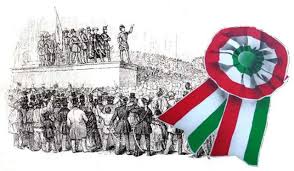15th March, 1848
National Song of Hungary
| On your feet now, Hungary calls you! Now is the moment, nothing stalls you, Shall we be slaves or men set free That is the question, answer me! By all the gods of Hungary We hereby swear, That we the yoke of slavery No more shall wear. |
Talpra magyar, hí a haza! Itt az idő, most vagy soha! Rabok legyünk vagy szabadok? Ez a kérdés, válasszatok! A magyarok istenére Esküszünk, Esküszünk, hogy rabok tovább Nem leszünk! |
| Slaves we have been to this hour, Our forefathers who fell from power Fell free and lived as free men will, On land that was their own to till, By all the gods of Hungary We hereby swear, That we the yoke of slavery No more shall wear. |
Rabok voltunk mostanáig, Kárhozottak ősapáink, Kik szabadon éltek-haltak, Szolgaföldben nem nyughatnak. A magyarok istenére Esküszünk, Esküszünk, hogy rabok tovább Nem leszünk! |
| Whoever now his life begrudges Deserves his death with thieves and drudges, For setting his own worthless hide Above his country’s need and pride. By all the gods of Hungary We hereby swear, That we the yoke of slavery No more shall wear. |
Sehonnai bitang ember, Ki most, ha kell, halni nem mer, Kinek drágább rongy élete, Mint a haza becsülete. A magyarok istenére Esküszünk, Esküszünk, hogy rabok tovább Nem leszünk! |
| The sword shines brighter than the fetters It is the finery of our betters, Of slaves and fetters we grow bored. Leap to my side, ancestral sword. By all the gods of Hungary We hereby swear, That we the yoke of slavery No more shall wear. |
Fényesebb a láncnál a kard, Jobban ékesíti a kart, És mi mégis láncot hordtunk! Ide veled, régi kardunk! A magyarok istenére Esküszünk, Esküszünk, hogy rabok tovább Nem leszünk! |
| Magyars, once more our name and story Shall match our ancestors’ in glory The centuries of shame and hurt Can now be washed away like dirt. By all the gods of Hungary We hereby swear, That we the yoke of slavery No more shall wear. |
A magyar név megint szép lesz, Méltó régi nagy híréhez; Mit rákentek a századok, Lemossuk a gyalázatot! A magyarok istenére Esküszünk, Esküszünk, hogy rabok tovább Nem leszünk! |
| And wheresoever we may perish Grandchildren those graves shall cherish Singing our praises in their prayers To thank us that our names are theirs. By all the gods of Hungary We hereby swear, That we the yoke of slavery No more shall wear. |
Unokáink leborulnak, És áldó imádság mellett Mondják el szent neveinket. A magyarok istenére Esküszünk, Esküszünk, hogy rabok tovább Nem leszünk! |
The Nemzeti dal ("National Song") is a poem written by Sándor Petőfi. On March 15th we commemorate the Hungarian Revolution and War of Independence of 1848-1849. This is also a public holiday in Hungary.
On March 15th we commemorate the Hungarian Revolution and War of Independence of 1848-1849. This is also a public holiday in Hungary.
The Hungarian Revolution of 1848 was one of many revolutions that year and closely linked to other revolutions of 1848 in the Habsburg areas. The revolution in the Kingdomof Hungary grew into a war for independence from Habsburg rule.
Many of its leaders and participants, including Lajos Kossuth, István Széchenyi, Sándor Petőfi, József Bem, are among the most respected national figures in Hungarian history, and the anniversary of the revolution's outbreak, on March 15th , is one of Hungary's three national holidays.
The Revolution started on March 15th in 1848, with bloodless events in Pest and Buda, followed by various insurrections throughout the kingdom, which enabled Hungarian reformists to declare Hungary's new government and the first Prime Minister of Hungary, Lajos Batthyány.
The new government approved a sweeping reform package, referred to as the "April laws" (also referred to as the "March Laws"), whichessentially created a democratic political system in Hungary. They also demanded that the Hungarian government receive and expend all taxes raised in Hungary, and have authority over Hungarian regiments in the Habsburg army.
In the summer of 1848, aware that they were on the path to civil war, the Hungarian government ministers attempted to gain Habsburgsupport against Conservative Josip Jelačić. By the end of August, the imperial government in Vienna officially ordered the Hungarian government in Pest to end plans for a Hungarian army. Jelačić thentook military action against the Hungarian government without any official order. War between Austria and Hungary had officially begun.
Initially, the Hungarian forces (Honvédség) achieved several victoriesfighting with Austrian armies (at Pákozd in September 1848 and at Isaszeg in April 1849). The war led to the October Crisis in Vienna, when insurgents attacked a garrison on its way to Hungary to support Jelačić's forces.
After Vienna was recaptured by imperial forces, General Windischgrätz and 70,000 troops were sent to Hungary to crush the last challenge to the Austrian Empire. Julius Jacob von Haynau, the leader of the Austrian army who then became governor of Hungary for a few months of retribution, ordered the execution of 13 leaders of the Hungarian army in Arad and the Prime Minister Batthyány in Pest.
to commemorate- megemlékezik
revolution - forradalom
war of independence - szabadságharc
public holiday – nemzeti ünnep
closely - szorosan
to be linked to – kapcsolódik valamihez
kingdom - királyság
to grow into – valamivé nő, fejlődik
Habsburg rule – Habsburg uralom
leader – vezető, vezér
participant - résztvevő
including - beleértve
respected - tisztelt
anniversary - évforduló
outbreak – kitörése valaminek
bloodless – vér nélküli
insurrection – felkelés, lázadás
throughout - mindenütt
to enable – lehetővé tesz
to declare – deklarál, kinyilatkoztat
government – kormány (országé)
to approve – helyesel, jóváhagy
sweeping – elsöprő, nagy lendületű
reform package - reformcsomag
referred to as – úgy nevezik
essentially - alapvetően
political system – politikai rendszer
to demand – igényel, követel
to expend - költ
authority – fennhatóság, hatalom
regiment - ezred
aware – felkészült, körültekintő, óvatos
on the path - úton
to attempt - megkísérel
to gain support – támogatást gyűjt
officially - hivatalosan
to take military action – katonai lépést tesz
initially - kezdetben
victory - győzelem

Forrás: 5perc angol, http://books.openedition.org/ceup/2379





